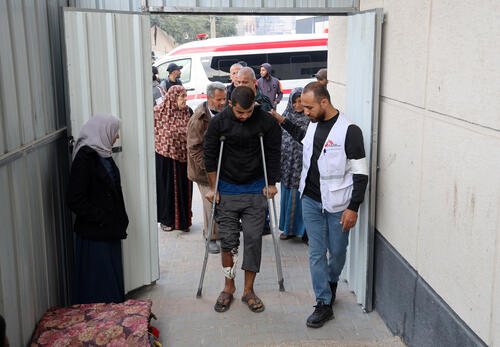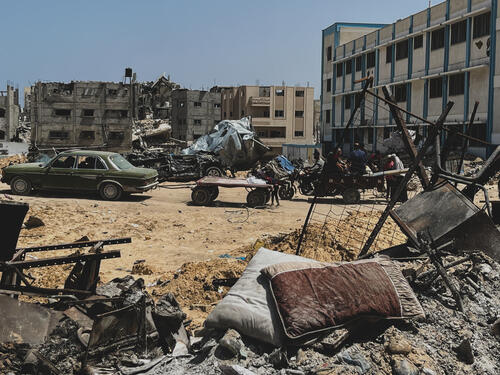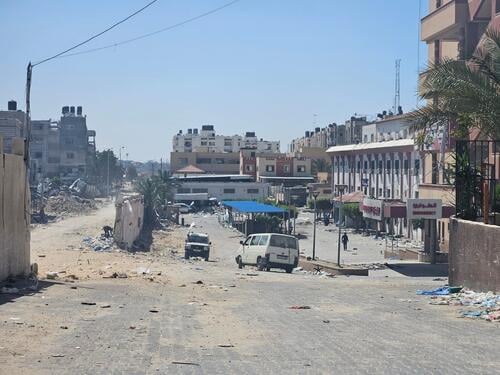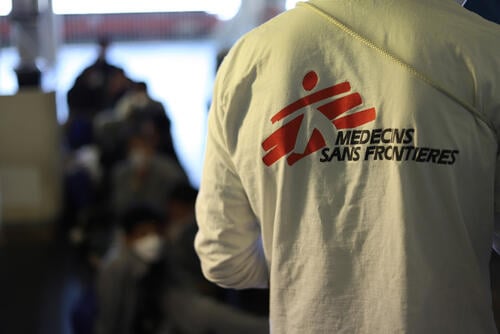Jerusalem – Over the past three months, the Israeli Forces’ all-out assault on the Gaza Strip, Palestine, has drastically diminished the options for people to find medical care. The amount of safe space for organisations to provide healthcare to people is now virtually non-existent. Constant evacuation orders and attacks on health facilities have repeatedly forced organisations such as Médecins Sans Frontières (MSF) to evacuate hospitals and leave patients behind.
“We’re gradually being cornered in a very restrictive perimeter in southern Gaza, in Rafah, with dwindling options to offer critical medical assistance, while the needs are desperately growing,” says Thomas Lauvin, MSF project coordinator in Gaza. “As the assault on Gaza has progressed, we have had to evacuate several health facilities in the north of Gaza, then in the Middle Area.”
“Today we are limited to mainly working in the south, because we cannot work elsewhere,” continues Lauvin. “In short, we’re running out of hospitals. We are forced to leave patients behind.”
Leaving Al-Aqsa hospital [...] was a devastating decision... Drone strikes, sniper fire and bombardments in the close vicinity of the hospital made the space too unsafe to work in.Enrico Vallaperta, MSF Project Medical Referent in Gaza
The healthcare system in Gaza has virtually collapsed. The World Health Organization reports that only 13 out of Gaza’s 36 hospitals are still partially functional: nine in the south and four in the north. The two major hospitals in southern Gaza are operating at three times their bed capacity and are running out of basic supplies and fuel.
On 6 January, MSF teams were forced to once again evacuate from a hospital. Our teams left the Al-Aqsa hospital in Gaza’s Middle Area, after Israeli Forces issued evacuation orders for neighbourhoods surrounding the hospital. This forced evacuation restricted our access to our own pharmacy store, demonstrating the deteriorating environment for medical activities.
“Leaving Al-Aqsa hospital and our patients was a devastating decision and our last resort,” says Enrico Vallaperta, MSF Project Medical Referent in Gaza. “Drone strikes, sniper fire and bombardments in the close vicinity of the hospital made the space too unsafe to work in. The volatile conditions leave us feeling incapacitated; there's virtually no secure space to provide even minimal medical care to people.”
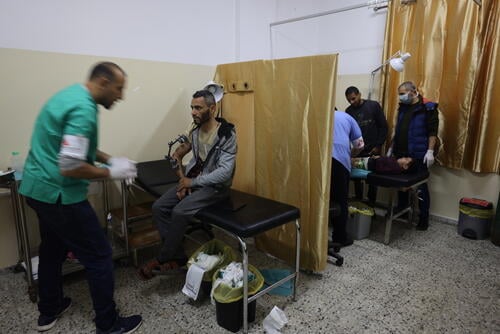
Medical facilities and their surrounding areas have repeatedly been hit by Israeli Forces and been subjected to evacuation orders in different parts of Gaza, particularly in the north, making access to, and the provision of, healthcare too dangerous. Several hospitals where MSF was working have been through this situation: the Indonesian hospital in north Gaza had to be evacuated in October. Al-Shifa hospital, Gaza’s largest, was hit and the staff forced to evacuate in November. Then Al-Awda hospital, MSF’s partner hospital since 2018, was hit and three doctors, two of whom were our staff, were killed.
Now, this pattern is repeating itself in the south, which hosts five times the number of people it did before the war, and fewer places to provide people healthcare.
The south of Gaza has been targeted by intense bombing since the November truce broke down and the needs for emergency, surgical and post-operative care are massive in the area. The lack of hospital capacity is depriving patients of adequate treatment and proper hygienic conditions, which result in increasing numbers of infected wounds and medical procedures being carried out in extreme conditions.
Today we are limited to mainly working in the south, because we cannot work elsewhere. In short, we’re running out of hospitals.Thomas Lauvin, MSF project coordinator in Gaza
Beyond critical injuries, many women who undergo a caesarean section are discharged just six hours after delivery to make space for other pregnant women. Some are simply turned away and give birth in tents.
MSF remains committed to providing medical care in Gaza and calls for the protection of hospitals, medical staff and patients. Our teams are currently providing pre- and postpartum care at the Emirati hospital in Rafah, assisting Gazans with physiotherapy and post-operative care at the Rafah Indonesian field hospital, and offering basic healthcare consultations, wound dressing and mental health support at Al-Shaboura clinic, also in Rafah.
We’re supporting the European Gaza hospital in a small surgical capacity, and our small team of nurses assist patients in need of wound dressing. In Al-Awda in north Gaza and Nasser hospital in Khan Younis, a handful of MSF staff are working in extremely difficult conditions, including lacking food and medical supplies due to airstrikes and nearby fighting.
We reiterate our call for an immediate ceasefire that will spare the lives of civilians and restore the flow of humanitarian assistance and re-establish the healthcare system on which the survival of the people of Gaza depends.



